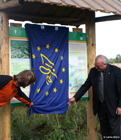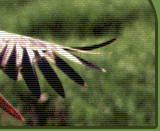Wild horses grazing in the City Centre On Wednesday, 29.08., in the centre of Jelgava (the forth biggest City in Latvia with 70 thousend inhabitants) – Pilssala – 16 wild horses from the Netherlands came for a domicile. In future they will help to keep Lielupe floodplain meadows from overgrowing with bushes. Wild horses grazing in the City Centre On Wednesday, 29.08., in the centre of Jelgava (the forth biggest City in Latvia with 70 thousend inhabitants) – Pilssala – 16 wild horses from the Netherlands came for a domicile. In future they will help to keep Lielupe floodplain meadows from overgrowing with bushes. The Lielupe floodplain meadows on the territory of Jelgava are a true nature territory of European scale. Many of rare birds and plant species found their homes there; however, their numbers decrease if the meadows overgrow with bushes. One of the ways to protect the meadows is to mow and pasture them. Why the wild horses The aim of bringing the horses is the upkeeping of restored Lielupe floodplain meadows by | 
| | Horses are akin to tarpan – | | wild horse, which used to | | inhabit also the territory of Latvia | pasturing the long grass and keeping the territory from overgrowing with bushes. Already since the autumn of 2004 The Latvian Fund for Nature in collaboration with Jelgava Council worked on the LIFE-Nature project “Restoration of Latvian Floodplains for EU priority species and habitats”. Just in the last two years more than 10 ha of bushes were cut out – mainly in Pilssala, also proceeded the mowing of two thirds of the reserve total area, that is 352 ha. Jânis Reihmanis, the representative of The Latvian Fund for Nature, notes: “Bringing the wild horses is a logical continuation to the start. In Jelgava city with 70 thousand inhabitants it is difficult to find someone who would be ready to manage cattle breeding or haymaking. Wild horses would upkeep the restored meadows for the sake of their stomachs.” Jelgava hosts ready to get on  | | Opening of information stand | | by chairman of Jelgava municipality | Jelgava Council representatives – Mayor Andris Râviňđ and deputy executive director of the Municipality Vilis Ďevčenoks – took part in welcoming the horses. Chairman of Jelgava Municipality emphasised that this is a new challenge for the city. Horses and city inhabitants will have to get on; he also added that Jelgava is the first city in Latvia where the wild horses live on the territory of the city. The city management share the same opinion with the representatives of The Latvian Fund for Nature that in the future it will be necessary to explain to the inhabitants of the city what rules should be followed in the natural reserve and while observing the horses. City inhabitants and horses will be safe The wild horses will also live on the pastureland in winter – the additional foddering will be necessary only in case of thick and long-term snowing. The horses will be looked after every day and will not endanger the inhabitants, because rivers Driksa and Lielupe separate them from the city, but the access from the side of Jelgava Palace already now is separated by a new-built pasture fence. The horses of Konik Polski specie are herd animals and instinctively they habituate to a certain territory. It is not typical for them to roam on broad areas, and the wild harem guards own territory. It is not typical for the horses to cross the river on ice, they stay to guard the available food and own territory. For each case it is planned to build winter paddock where part of the pastureland will be fenced also from the river side. The horses will be looked after every day The wild horses will daily be looked after by the inhabitant of Jelgava Einârs Nordmanis, the  | | Herdsman Einârs | graduate of the Faculty of Forest of LUA. When living on the island, the natural reserve and pastureland for the horses are easily viewed. Already earlier he was concerned about the floodplain meadows on the banks of Lielupe, and that is how the collaboration with nature protection organizations started. He points out that warning the visitors from feeding the horses with bread is of the same importance as looking after them. It degrades the habits of the animals and shortens their lives by causing metabolism problems. It is also prohibited to tease them or try to stroke. The representative of the Netherlands Fund ARK Jan van der Veen adds that definitely no one should come to the herd of horses closer than 15 metres. What further changes expected in Pilssala The natural reserve on the island to the north from Jelgava Palace exists already since 1999, and in 2004 it was admitted the place of Natura 2000 – especially protected natural territory at European scale. That is why the same rules as for other Latvian natural reserves are applicable here – until the Cabinet of Ministers do not approve for “Lielupe Floodplain Meadows” natural reserve the individual rules for maintenance and protection, which would more precisely define the protection and maintenance of the certain territory. On the territory of Pilssala natural reserve it is prohibited to: - litter the surroundings with garbage;
- air the dogs without the dog-lead;
- make fire and camping without permission;
- dig up the soil in search of fishing bait;
- feed the horses with bread or try to come nearer than 15 metres.
Next to the border of the reserve for a great while there is a road sign “no passage”, which allows driving further down this place only to the keepers of the territory. It is allowed to walk down the road, although it is not recommended to enter the pastureland behind the fence, because the horses will become flighty. Fishing is still allowed, although it is necessary to consider the restriction during the birds nesting period, when starting from spring until the end of June it will be prohibited to visit the northern part of Pilssala. Those who like to jog in Pilssala – there is almost a kilometre from the beginning of the fence until the Boat base, and it is allowed to jog behind the fence if it doesn’t disturb the horses. During the nesting season it would be preferable to use the southern part of Pilssala and jog only to the fence. In nature protection plan developed by the representatives of The Latvian Fund for Nature in 2006 it is planned that Pilssala could have its own observation tower. It is a possibility that initiative inhabitants of Jelgava could use, and it would become one of the most visited tourism objects in the city. More information coming  | | Setting up of infostand | | on Pilssala | To instruct the visitors of Pilssala there is an information stand placed, and soon another stand will be available on the right bank of Lielupe in front of the northern side of Pilssala. A booklet in English and Latvian about the natural values in the floodplain meadows of Lielupe is already published. After the horses fit in more, it will be possible to apply for excursions for schoolchildren, guided by E. Nordmanis. Booklets are available free of charge in Jelgava Tourism Bureau. Horses and birds Already since the founding of the reserve, Lielupe floodplain meadow has been a significant nesting place of rare birds species. One of the biggest densities of Spotted Rail nesting in Latvia is registered here; Corncrakes and wader birds are frequent in great numbers. These are the species which need open areas on the meadows. Waders – Black Godwits, Great Snipes, Ruffs  | | Corncrake Crex crex | and Redshanks – need lower grass, which will be provided by the horses. They pasture the territory unevenly, always leaving also separate “nasty” and longer grass ideal for birds nests. Horses guard this territory from their enemies, thus making safe also birds nesting. They control their movements very well and move basically down the beaten tracks, that’s why there is no danger of trampled nests. Similarly is with the protected plants that bloom at very different times – from May to August. Horses by selection eat what is tastier for them – stem grass, green leaves, bush sprouts. Often with the help of horses the seeds of separate plants spread across broader territories. The supporters The restoration of Lielupe floodplain meadows is organized by the Latvian Fund for Nature within the framework of the European Union’s LIFE-Nature project “Restoration of Floodplain Meadows”. In their turn, the concern in wild horses and the further environmental education programme have the Netherlands Fund for Nature ARK represented by Jans van der Veins, who deals with the adaptation of wild horses in the especially protected natural areas for already 14 years. 
Andris Klepers, LDF |







